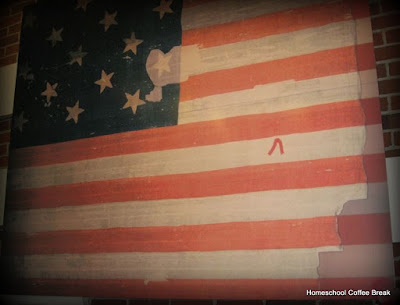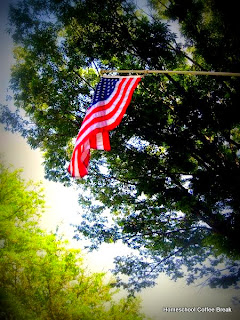This post contains affiliate links - using affiliate links from HS Coffee Break helps fuel this blog.
Happy Flag Day!
On June 14, 1777, the Second Continental Congress passed the Flag Act of 1777. This resolution established an official flag for the new nation and specified that the flag . . .
be made of thirteen stripes, alternate red and white; that the union be thirteen stars, white in a blue field, representing a new Constellation.
The new national flag became known as the Stars and Stripes, and was based on the "Grand Union" flag, which was a banner carried by the Continental Army in 1776 that was thirteen red and white stripes.
The design stayed the same for until 1794, when two stars and two stripes were added to represent Kentucky and Vermont as the newest states in the union. New stars and stripes were added to represent more new additions, until 1818, when Congress enacted a law restoring the original thirteen stripes, and stating that only stars be added to represent new states.
Did you know? The version of the flag that inspired Francis Scott Key's poem known as The Star-Spangled Banner was the 15-salthtar (that's flag-speak for stars), 15-stripe flag that flew over Fort McHenry during the War of 1812. (For more, see From the High School Lesson Book - The Star-Spangled Banner)
 |
| The Star-spangled Banner displayed at Fort McHenry. |
Did you know? The U.S. Army issues a reference guide of acceptable shades to be used in local, state, and national flags; and it specifies the exact shades of white, "Old Glory Red", and "Old Glory Blue" to be used in an authentic American flag. However, many flag manufacturers use the more easily processed Pantone matching shades in flags intended for the mass market.


The first Flag Day observance was held on the 100th anniversary of the flag's adoption - June 14th, 1877. The U.S. flag was to be flown from all public buildings in the country. Several states continued to observe the anniversary over the years, and in 1949 Congress officially designated June 14th as Flag Day. Since then, Flag Day has been a national holiday, but not a federal holiday. National holidays celebrate independence or another important occasion in the nation's history, but federal holidays are also public holidays and government offices are closed. That's why very few of us get a day off work or school for Flag Day!
Most patriotic Americans are offended when the flag is disrespected by people burning it or stomping on it. Some of the first statutes to protect the flag were not aimed at stopping destruction, but restricted the use of the flag on commercial products. This was viewed as treating the flag with contempt.
The U.S. Code provides a guide for all handling and display of the flag, but does not impose penalties for misuse of the flag. Each state has its own flag laws, which may impose penalties. The Flag Code formalizes some traditional respect shown to the flag, and specifies ways in which the flag is not to be used. The flag should never be dipped to any person or thing; it should not be used as drapery, or as part of a costume or athletic uniform; it should not be used for any advertising purpose; and should not be imprinted or impressed on anything intended to be discarded after temporary use. (Doesn't it seem like the flag is being misused a lot? Apparently when it's stylized for clothing that makes it okay. To me, even if it's stylized, I feel a little uneasy about using napkins or paper plates with a flag design!) When lowered, no part of the flag should touch the ground or any other object; and when a flag is so worn that it's no longer fit as a symbol of our country, it should be destroyed by burning in a dignified manner. American Legion Posts and other organizations conduct dignified flag burning ceremonies, often on Flag Day, so if you have a torn or badly faded flag that should be retired, try contacting the Legion for information.
There are clear guidelines for how the flag is to be flown as well. It should be flown with the union at the peak of the staff unless it is being flown at half-staff. When flown with other flags, it must always be in the position of honor - no other flag should be above or larger than the US flag. When the flag passes in a procession, all should face the flag and salute - those in uniform with a formal salute, and those not in uniform with right hand over the heart and head covering removed. During the Pledge of Allegiance and National Anthem, citizens should all remain at attention and salute.
 |
| Photo courtesy: CAP |
For more details on Standards of Respect and Flag Etiquette, visit USFlag.org.
An earlier version of this post appeared on Homeschool Coffee Break as Flag Day 2016.
Don't miss a coffee break! Subscribe to HS Coffee Break by email
©2006-2022 HS Coffee Break. All rights reserved. All text, photographs, artwork, and other content may not be reproduced or transmitted in any form without the written consent of the author. http://kympossibleblog.blogspot.com/
We are a participant in the Amazon Services LLC Associates Program, an affiliate advertising program designed to provide a means for us to earn fees by linking to Amazon.com and affiliated sites.















































0 comments:
Post a Comment
I love comments! It's like visiting over a virtual cup of coffee.